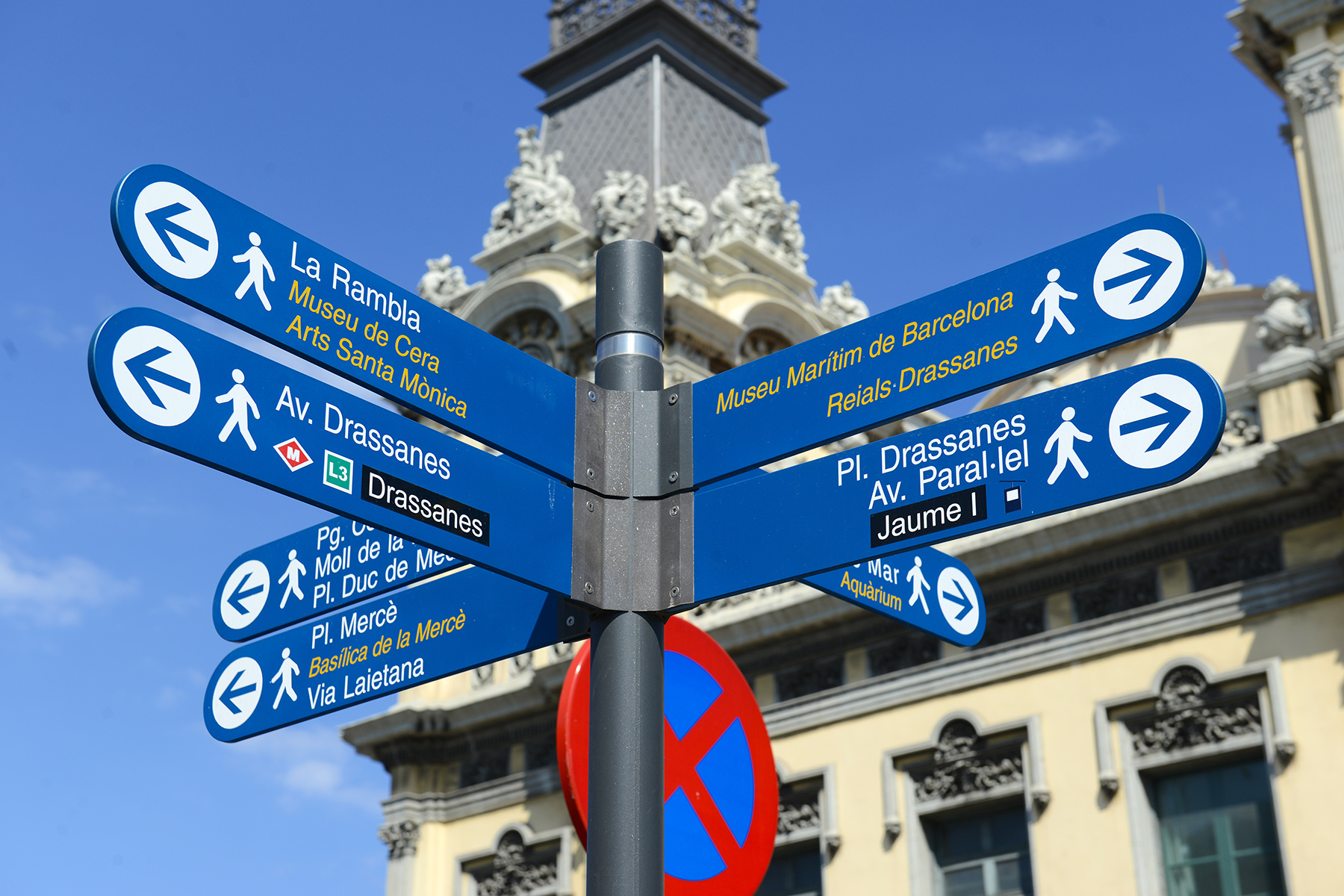Tempted to learn Spanish in Spain or perhaps grasp the basics before you move to the sunny country? Either way, getting to grips with Spanish will make it a lot easier when it comes to setting up your new life there; from arranging your visa and finding a place to live, to setting up your basic utilities once you arrive.
Luckily, there are many ways to learn this vibrant language, whether you prefer a formal setting or a casual online space. From expensive in-person classes to free apps and everything in between, there are plenty of options to get you started.
To help you decide the best method for you, this guide will walk you through the ins and outs of learning Spanish, including the following:
- Why learn Spanish?
- How to learn Spanish before moving to Spain
- Where to learn Spanish in Spain
- Government Spanish lessons in Spain
- Learning Spanish online
- Learning Spanish with a computer or smartphone app
- How to learn Spanish outside of the classroom
- Spanish for children
- Official language examinations and qualifications in Spain
Preply
Immerse yourself in the language of your new country with Preply. This app and website matches learners with online tutors so you can follow live, personalized language classes. With 50 languages to choose from, and tutors all over the world, there’s a course for everyone. Check out Preply to start your language-learning journey today.
Why learn Spanish?
Spanish is the dominant language in Spain. In fact, over 72% of the Spanish population speak it as their first language. Of course, other dialects may also be spoken in other areas. For example, Catalan is widely used in the regions of Catalonia, Valencia, and the Balearic Islands, while Galician and Basque are used in Galicia and the Basque Country, respectively.
However, Spanish, also known as Castilian, is the predominant language in Spain. As such, it can be very useful to have at least a basic understanding of it if you plan to move to the country.

Whether you learn Spanish in Spain or elsewhere, it is a very useful language to know. This is because there are 471 million native Spanish speakers in the world, making it the second most widely-spoken language in the world, behind Chinese. And, of course, it is the official language in 22 countries including Bolivia, Colombia, Costa Rica, Colombia, Mexico, Peru, and Puerto Rico.
Spanish is also one of the easiest languages for native English speakers to learn. This is because English and Spanish are both Latin languages, so have a similar linguistic base. As such, most English speakers would only need about 600 hours to master the language; instead of the 2,200 estimated for more complex languages like Arabic or Mandarin.

Of course, understanding Spanish will also give you access to a wide range of entertainment options while living in Spain. For example, you will have an easier time listening to the news on TV, watching films, listening to music, and even venturing out to the theater.
How to learn Spanish before moving to Spain
Of course, you could wait until you move to Spain before you learn the language. After all, you would have the benefit of immersion. However, as we have already mentioned, it can be useful to have a basic grasp of Spanish before you move; even if you plan to learn Spanish in Spain.
Either way, expats who choose to learn Spanish will enjoy significant advantages upon arrival in their new home country. For instance, it might be easier for them to arrange a visa or secure a job, or perhaps attend primary school, secondary school, or university. And, of course, having a few choice Spanish phrases up your sleeve will ease your cultural integration into the country.
International Spanish language schools
If you want to learn Spanish in Spain, then you may wish to get a headstart in the classroom before you move. If this sounds like you, then you may want to look for a language school that has locations in both Spain and your home country. That way, you can seamlessly continue to learn Spanish in Spain after you move.

Because Spanish is so widely spoken around the world, it should come as no surprise to learn that there are many international language schools where you can learn it. Here are a few that may be useful:
- Cervantes Institute – a Spanish public institution that aims to further the teaching of Spanish around the world with locations in 90 cities across 43 countries.
- Berlitz – a popular language school that offers classes in a variety of different settings, ranging from group classes to private, one-on-one lessons.
- Language International – an online search portal that allows you to find thousands of Spanish language schools around the world and arrange private, one-to-one lessons.
Where to learn Spanish in Spain
A strong reason for learning Spanish in Spain is that you will have access to a wide range of classes. For example, you can attend intensive courses and immersion programs, as well as casual conversational classes or summer camps. And, of course, many of these will offer class visits to some of Spain’s famous historic sites, museums, bars, and restaurants.

As such, you will have the added benefit of accelerating your learning through immersion. With this, you will also be able to pick up some popular Spanish phrases and informal expressions.
Language schools in Spain
Cervantes Escuela Internacional
Cervantes International School is part of the Cervantes Institute network, which is a group of accredited Spanish schools in Spain and abroad. The main campus is located in Malaga, but there are partner schools in six other cities. Cervantes offers Spanish lessons for all levels and ages, in addition to accommodation and activities. The language institution also guarantees students’ success at the DELE exam.
Locations: Malaga, Barcelona, Madrid, Granada, Salamanca, Seville, and Valencia
don Quijote
The don Quijote language school offers Spanish lessons to students across Spain and Latin America and has a strong history that spans two decades. The school offers more than 20 Spanish courses, from beginner Spanish courses to Spanish teacher level. These can also be combined with activities such as cooking, scuba diving, and tango dancing. There are also specialized classes for specific industries, so students can learn medical or business Spanish.
Locations: Alicante, Barcelona, Cadiz, Granada, Madrid, Malaga, Marbella, Pamplona, Salamanca, San Sebastian, Seville, Tenerife, and Valencia
Enforex
Enforex has 13 language schools across Spain, and even more in Latin American countries. They provide Spanish courses for travelers, intensive learners, as well as business learners and children. They also offer a Spanish summer camp for students aged five to 18 years in several major cities in Spain. These day and residential camps allow children to make Spanish friends their own age, with around 60% of Spanish students attending, while improving their language skills and participating in a variety of sports, excursions, and other activities.
Locations: Alicante, Barcelona, Cádiz, Granada, Madrid, Málaga, Marbella, Pamplona, San Sebastian, Salamanca, Sevilla, Tenerife, and Valencia
Estudio Sampere
Estudio Sampere is a small group of family-run boutique schools. They have been offering Spanish lessons to international students since 1956, and now have locations in Cuba and Ecuador. Today, Sampere offers a variety of programs, including intensive Spanish courses, DELE preparation classes, and beginner and teen classes. The school is recognized by leading Spanish institutions, including Instituto Cervantes, IALC (International Association of Language Centers), AATSP (American Association of Teachers of Spanish and Portuguese), and NAFSA (Association of International Educators).
Locations: Alicante, Madrid, and Salamanca
International House World Organization
International House is a global network of schools with seven locations in Spain. Spanish lessons focus on practicing grammar in contexts that replicate everyday life, and students can combine classes with activities such as cultural visits. Their courses include general Spanish courses, Spanish for business, DELE preparation, as well as Spanish cooking classes. The majority of students are between 20 and 40 years of age.
Locations: Barcelona, Cadiz, Palma de Mallorca, Madrid, San Sebastian, Seville, and Valencia
Home Language International
Home Language International offers full-immersion Spanish programs. Because you will be the only student in your accredited language teacher’s house, you will have the opportunity to learn Spanish in Spain in a useful way. Classes range from 10 hours to a full week and involve trips as well as other fun cultural activities, but you can fully customize your program.
Locations: Alicante, Barcelona, Basque County, Granada, Madrid, Malaga, Marbella, Salamanca, Seville, Tenerife, and Valencia
Linguaschools
Linguaschools offers seven locations in Spain and prides itself on Spanish lessons that foster a more familiar atmosphere for students. Teachers take the time to get to know their students and understand what they need so that they can give proper instruction. While the schools offer a wide range of courses and other services, they are small enough to provide personalized service.
Locations: Barcelona, Granada, Madrid, Malaga, Salamanca, San Sebastian, and Valencia
Government Spanish lessons in Spain
Las Escuelas de Idiomas is a network of government-funded language schools with locations dotted all across Spain. Although the schools specialize in Spanish, they also teach other modern languages. Because courses are quite reasonable – most cost less than €100 – this is also a cost-effective way of learning Spanish in Spain.

Many regional Spanish governments also offer Spanish lessons for newcomers. In the Madrid region, for instance, the local government runs the Escuelas Oficiales de Idiomas de la Comunidad de Madrid (Official Language Schools of the Community of Madrid). As well as learning Spanish here, students can also learn German, Arabic, French, English, Irish, Japanese, Russian, and more modern languages.
Additionally, the Valencia and Catalan regions have similar government-run setups for learning Spanish in Spain. Depending on where you move to in the country, you might be able to arrange some language lessons by checking the local government website.
Learning Spanish online
Whether you learn Spanish in Spain or before you arrive, there are plenty of online courses that can help. And the best part is, you can do them as and when you please, whenever they fit your schedule. If you want to try learning Spanish online, here are a few places to start:
- Berlitz – this well-known website offers a wealth of online resources; from group or private live classes, to learn-at-your-own-pace programs, and classes for kids. These cover everything from vocabulary and grammar to reading, speaking, and writing.
- Coffee Break Spanish – these free podcasts allow you to learn or improve your Spanish on the go, where and when it suits you. You can also take it one step further and sign up for a course that gives you access to video materials, lesson notes, and bonus audio content.

- FluentU – this allows you to learn Spanish by exploring a collection of the web’s best Spanish video content including music videos, movie trailers, and commercials (with English and Spanish subtitles).
- Go! Go! España – working with the LAE Madrid Spanish Language School, this two-week online course teaches the basics of Spanish.
- International Association of Language Centres – offers a range of online language lessons for different levels with highly qualified teachers.
- LanguaTalk – find Spanish teachers for one-to-one tuition at a time that suits you.
- Spanishpod101 – this YouTube channel of videos helps you to casually learn speaking everyday Spanish
- StudySpanish – offers free online services and audio conversational courses to help students learn to speak Spanish fluently all over the world.
- Yojik – offers free online Spanish courses developed by various US government departments.
Other handy online Spanish-learning resources
While learning Spanish, it can be useful to have a few extra tools to help you with translation and expanding your vocabulary. Here are a few to try:
- Google Translate
- ZeroGPT – this translation tool also provides an AI detector, plagiarism checks, and word counters.
Learning Spanish with a computer or smartphone app
If you want to casually learn Spanish in Spain or plan to master the basics before you move, downloading a language learning app can be really useful. Here are a few popular ones to get you hablando (talking) like a pro in no time.
- Babbel – If you’re looking for an extensive course that integrates all language skills, then you might want to consider getting the full version of Babbel.
- Beelinguapp – Beelinguapp offers audiobook lessons that can be easily downloaded. As such, the app relies on learning through listening to short stories, thus teaching you words through familiar texts.
- Busuu – Busuu uses easy navigation and a social network to keep you motivated and working on progressively harder tasks. And, it’s free and combines listening and writing tasks.

- Duolingo – Considered to be the best free language learning app on the market, Duolingo has an arsenal of topics, vocabulary, and lessons. Give it a whirl while you’re waiting in line at the supermarket.
- Memrise – Memrise features a range of interactive games that allow you to practice your skills. Packs include special speed rounds, listening skills, and difficult words, making them ideal for all users.
- Mondly – This app involves daily bite-size lessons to help you learn Spanish a little bit at a time. As such, you only need to spend about 45 minutes a day on the app.
- Rosetta Stone – These award-winning apps allow you to train yourself to speak Spanish using cutting-edge technology. You can download lessons and speech recognition technology that helps you improve your pronunciation.
- Speaktribe – Speaktribe concentrates on teaching you Spanish in a vocal way, allowing users to chat interactively.
- Wlingua – Wlingua is ideal for beginners and advanced speakers. Phrase and sentence exercises are recorded, allowing you to concentrate on pronunciation.
Here are some additional options you might want to consider:
How to learn Spanish outside of the classroom
You can attend all the formal Spanish classes and courses you want. But if you really want to master the language, your best bet is to get out and use it in everyday life. After all, you might as well learn Spanish in Spain while you are living there because you will hear it all around you. Here are a few suggestions for real Spanish immersion:
- Find local Spanish friends to practice with, or search for Meetup groups to join in your area
- Seek our local conversation clubs via Facebook as this is a great way to practice Spanish and make new friends
- Listen to Spanish radio and TV to get used to casual phrases and idioms
- Immerse yourself in the world of Spanish dramas and movies; you will be surprised at how quickly your vocabulary and understanding improves
- Join a free language exchange such as Meet & Speak in Madrid
Spanish for children
There are many apps and online courses that will help your children learn Spanish and become more familiar with the language. Of course, hiring a tutor is also an option. However, your children may also be able to learn Spanish in primary schools in Spain.

This is because most state schools offer extra lessons for students whose Spanish is not up to scratch. Furthermore, international or private schools will usually offer Spanish as a second language.
Official language examinations and qualifications in Spain
If you want to formalize your mastery of Spanish, you will need to take the tests for the DELE. The Diploma de Español como Lengua Extranjera (Spanish as a Foreign Language Diploma) is a series of tests that covers writing, reading, listening, and speaking across six levels.
Because it is overseen by Spain’s Ministry of Education, Culture, and Sport, and overseen by the Instituto Cervantes, it is the ultimate flex when it comes to being a Spanish speaker. Prices range from €108 to €160, however, this depends on which level of exam you are taking.









